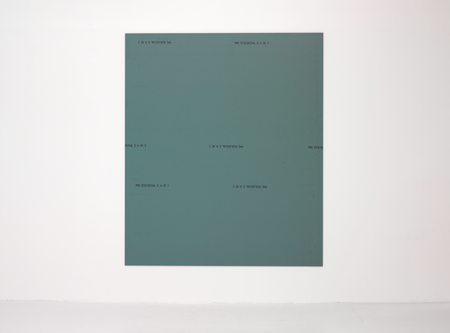Mudanças entre as edições de "Reversed Mirror/en"
(+imagem) |
|||
| Linha 1: | Linha 1: | ||
| − | + | =Reversed Mirror= | |
| + | Stefan Brüggemann | ||
| + | |||
| + | |||
| + | By reversing a mirror and gluing it to the wall, Stefan Brüggemann denies us the possibility of reflecting on them, but invites us to reflect about them. About our own vision, since the absence of something makes us think about it; In this case, the lack of the reflected image leads us to reflect about the image. About a world of reflections and specular images that is no more than six millimeters thick. | ||
| + | |||
| + | Mirrors are not devices used by people just to see themselves, but also to see what lies behind them (retrovision). If we naively extrapolated this observation, we would be led to believe that by turning the mirror forward we could "see" what lies before us (foresight). But this attempt would not only be frustrated, it would be threefold frustrated: one would not see what is ahead, one would not see what is behind, one would not reflect anything. | ||
| + | |||
| + | Brüggemann somehow evokes what happens when things are turned toward the future (what lies ahead) and don't face the present or the past (themselves or behind them). It thus suggests that fantastic imagery of imaginary futures exists only between "the mirror and the wall" and does not reflect any part of the present or past realities that could condition them. | ||
| + | |||
[[Arquivo:Stefan.png|500px]] | [[Arquivo:Stefan.png|500px]] | ||
Edição atual tal como às 11h11min de 2 de julho de 2017
Reversed Mirror
Stefan Brüggemann
By reversing a mirror and gluing it to the wall, Stefan Brüggemann denies us the possibility of reflecting on them, but invites us to reflect about them. About our own vision, since the absence of something makes us think about it; In this case, the lack of the reflected image leads us to reflect about the image. About a world of reflections and specular images that is no more than six millimeters thick.
Mirrors are not devices used by people just to see themselves, but also to see what lies behind them (retrovision). If we naively extrapolated this observation, we would be led to believe that by turning the mirror forward we could "see" what lies before us (foresight). But this attempt would not only be frustrated, it would be threefold frustrated: one would not see what is ahead, one would not see what is behind, one would not reflect anything.
Brüggemann somehow evokes what happens when things are turned toward the future (what lies ahead) and don't face the present or the past (themselves or behind them). It thus suggests that fantastic imagery of imaginary futures exists only between "the mirror and the wall" and does not reflect any part of the present or past realities that could condition them.
